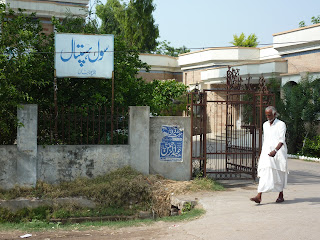Small things like 'alif madd aa'
One summer evening in 2025, I sat down for tea outside the Quetta Hotel in Lahore ’s Firdous Market . The place was crowded as usual. Three young Pashtun boys joined my table as this was the only table with three empty chairs. I had the fourth. They spoke Pashto among themselves, but one of the boys was on the phone explaining to someone in Urdu about his difficulties in getting his National ID Card from the National Database Regulatory Authority ( NADRA ). Apparently, his father had mistakenly provided the same name for him and his brother at the time of registration. This boy was now trying to sort out the mistake in NADRA records to get his ID card made. “My name is Gul Khan and my brother is Agul Khan. There’s a difference of alif madd aa only... we live in Gulberg …,” he went on trying to explain on the phone. They were in their early 20s, perhaps daily wage laborers or house help in the posh loc...
